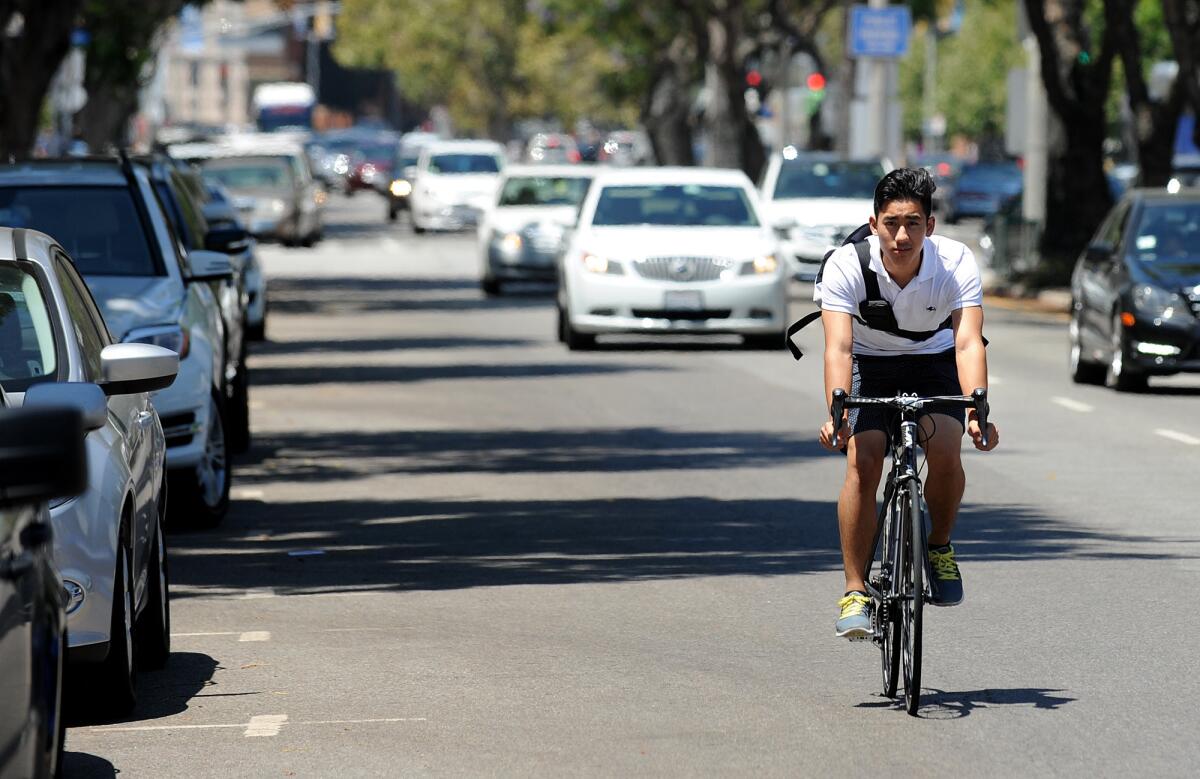California bicyclists would be allowed to roll past stop signs under proposed law

Cyclists would be allowed to pedal past stop signs — without stopping — under legislation proposed by two lawmakers who say it would make the roads safer.
The two-tiered approach to the rules of the road — one for cyclists and one for cars — is unlikely to ease growing tensions over sharing California’s roadways.
Bike advocates have won such victories in the Statehouse as requiring drivers to yield a three-foot radius of maneuvering room to cyclists or face fines. Motorists meanwhile have expressed frustration that they see certain cyclists pick and choose which laws to follow.
Assemblymen Jay Obernolte (R-Hesperia) and Phil Ting (D-San Francisco) introduced their measure on Friday that would allow bicyclists to treat stop signs as merely yield signs — proceeding with caution if conditions are safe.
In effect, it would legalize the so-called California roll, although just for bicyclists.
“It’s pretty compelling that the data supports this kind of change in the law,” said Obernolte, an avid bicyclist. “Their loss of momentum causes them to spend a substantially longer amount of time in the intersection.”
The longer it takes for a bicyclist to pass through an intersection, the greater likelihood that they’ll get hit by an oncoming vehicle, he said.
Research of a similar policy in Idaho, the only state in which bicyclists are currently allowed such freedom, found a decline in bike-related injuries after the law was enacted.
Under the proposed law, bicyclists would still have to stop at red lights, which Obernolte said might motivate them to take less-traveled side roads rather than main roads with traffic signals. That could lessen congestion and boost safety, he said.
Obernolte emphasized that bicyclists would only be allowed to go through a stop sign if it was safe, something they would have to assess as they approach the intersection.
“It’s intentionally vague because it’s left up to the discretion of the bicyclist” he said.
In Southern California, a spokesman for the San Diego County Sheriff’s Department said he couldn’t say whether the law would increase safety or work in the reverse.
“It’s similar to any traffic violation. It’s dependent to the area if there are serious safety concerns,” spokesman Ryan Keim said. “But our No. 1 priority is safety for bicyclists and motorists.”
While it’s technically illegal for a bicyclist to blow through a stop sign in 49 states, it’s a law that’s not always enforced. Obernolte said his legislation would mean that there’s no longer any sort of gray area about whether police would enforce the regulation.
“There’s nothing more frustrating to the average citizen than a law that’s selectively enforced,” he said.
Of the 1,625 tickets given to bicyclists in San Diego between Jan. 1, 2015, and May 31, 2016, some 526 citations were related to stopping and yielding, more than any other category. Another 79 were cited for not obeying a traffic device or sign, but it’s unclear whether those tickets involved a stop sign or red light.
The legislation would break the “same road, same rights, same rules” philosophy endorsed by many bicyclists, which requires people on two wheels to follow the same traffic laws as people driving on four.
This exception might be warranted, said Andy Henshaw, executive director of the San Diego County Bicycle Coalition.
“It’s hard to argue against good data like that. And sometimes in this case, it doesn’t always work to have the same roads, same rules, to apply to both cars and bikes,” he said.
There might be a temporary period of increased risk as people on bikes and motorists get used to a new rule, but it might eventually help alleviate traffic tie-ups, said bicycle courier Chris Venkus.
“I think that a lot of traffic gets held up because bicyclists are trying to follow the same laws that cars are going through,” he said. “The numbers are increasing; there are more and more bicyclists out there. It would be very wise to start looking at different bicycle laws.”
Others who make their living on bicycles think otherwise. Mo Karimi, owner of San Diego Bike Shop, said he thinks the bill is a bad idea because it will create uncertainty between motorists and bicyclists, particularly in more developed areas.
“It’s a bad idea, a safety hazard,” he said. “In city areas, that’s going to be a problem. Everybody already knows the rules.”
It would be better if police officers enforced the current law in situations in which bicyclists ride dangerously rather than amending the current statute, he said.
Joel West, an Oceanside resident who has worked in his community on transportation issues, said the bill is a bad idea that will encourage bad habits.
If enacted, he predicts that instead of cautiously riding through stop signs, bicyclists will completely ignore them because the law gives them the discretion to determine what’s safe.
“Before, I was slowing down enough so it kind of looked like I was taking it seriously,” he said. “But if I get to decide what is a reasonable speed, I am going to go through faster than ever before.”
Youngsters on bikes will be particularly at risk, he said. They haven’t developed the physical skill or the personal judgment to determine how much of a risk oncoming or opposing traffic poses, he said.
Obernolte and Ting’s bill is based on the law Idaho passed in 1982. Jason Meggs, a researcher at UC Berkeley, compared Boise, Idaho, against Sacramento and Bakersfield and found that cycling was significantly more dangerous in the two California cities.
Stewart writes from the San Diego Union-Tribune.
ALSO
L.A. City Councilman Curren Price faces questions over two marriages
Oroville Reservoir reaches ‘pivot point,’ state water official says
More to Read
Sign up for Essential California
The most important California stories and recommendations in your inbox every morning.
You may occasionally receive promotional content from the Los Angeles Times.










